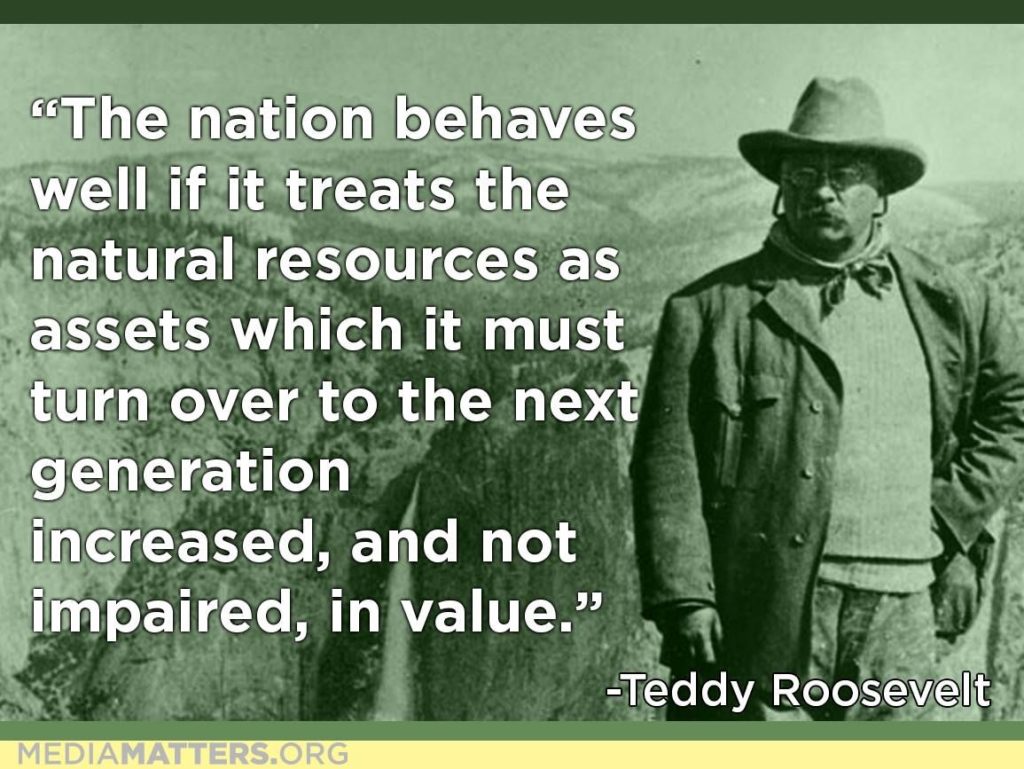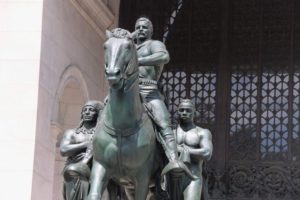
Theodore Roosevelt’s devotion to the preservation of American natural resources is legendary. The challenge of climate change speaks to the depths of and potential conflicts between TR’s interests in conservation, social justice and national security. While it is always risky to speculate about how a historical figure would deal with current issues, applying his philosophy to the problem may be helpful as we develop the national consensus necessary to address the issue.
First, as one of the foremost natural scientists of his day whose works are still used as references, TR would have accepted the basic science of global warming and been alarmed by its effect on forests and the environment. He would have had nothing but contempt for climate change deniers. Indeed, he probably would have come up with one of his pithy insults to describe them.
At the same time, his sympathy for the common man and inherent nationalism would cause him to bristle at the idea that Americans should bear the primary sacrifice of reducing world carbon emissions. The man who rode with poor cowboys and led them up Kettle and San Juan Hills would have remembered the average American’s sacrifices to win two world wars, defeat communism, and build an international system that lifted hundreds of millions out of poverty. He would not ask them for further sacrifices without being able to assure them with a straight face that others were sacrificing equally.
However, as a student of international relations dedicated to keeping America safe and strong, he would know he could not make that kind of guarantee while China and the rest of the world continued to increase their rate of emissions. The man who foresaw the rise of Japan would have understood the desire of these nations to develop their economies and gain respect in the international community, as I discussed in a previous post. He would hesitate to embark on an international crusade to force them to reduce carbon emissions if it would significantly damage American national security and create an equally damaging economic upheaval at home.
So how would he have reconciled these conflicting priorities?
Conservation is a great moral issue, for it involves the patriotic duty of insuring the safety and vitality of the nation.
Theodore Roosevelt, The New Nationalism, August 31, 1910
Because of Roosevelt, America led the world in natural resource conservation. He would have expected it to do so again on a threat like climate change, but only to the extent other nations were willing to follow. He would remember it was China and the developing world, not the United States, that insisted the limits in the Paris Accords be voluntary and unenforceable. The agreement was a start, not a sacred totem, that bound the United States no more than other signatories. Instead, it freed us to negotiate as the great power we are to develop more stringent limits that were enforceable. TR would have pushed carbon emission limits in bilateral trade and other agreements with China and other leading nations. In particular, he would not have entered into the Obama Administration’s climate agreement with China that allowed them to avoid any real limits on their emissions until 2030, effectively ceding economic leadership to them for the next decade.
Nevertheless, he would have insisted it was our moral duty to reduce America’s emissions as much as possible. In addition to phasing out coal generation plants, he would have pushed for stringent leak detection systems on energy facilities, though he would not have sought the immediate end to oil & gas production because of the economic shock it would cause. Roosevelt would have been a fan of distributed electric generation in the form of rooftop and small solar and hydrogen fuel cell units, mainly because they give the common man, not corporations, control of a family’s energy supply. Any mandates and subsidies for preferred clean energy sources would have come with corresponding utility-style rate and quality of service regulation of those industries to prevent excess profits. Displaced workers would be re-trained and new clean energy companies would have been expected to hire them at decent wages. Hopefully, these initiatives would have been accomplished through congressional legislation, though TR would not have hesitated to use the “bully pulpit” of the presidency and executive power to achieve them if necessary.
All of this would have been contingent on the effect on the American family and our national and economic security, even if it extended the goal of carbon neutrality another few decades. Carbon reduction goals would have been calibrated to the reductions of other nations to insure the American people were not carrying too much of the load. The “big stick” of tariffs and other trade sanctions would always be available for use against willfully profligate countries, but it would have been used only when it did not damage other national security goals.
These limitations, however, would have caused the scientist and political realist in Roosevelt to reluctantly admit that the Paris Accord’s goal of reducing the increase of global temperatures to below 2 degrees Celsius was unattainable. To protect both our resources and our people, adapting America to global warming would have been his highest priority. In addition to flood control and other infrastructure projects to protect communities from future sea rise and temperature changes, federal funding would have been made available to move people to safer ground. Agricultural research would concentrate on developing crops that could withstand higher temperatures. Smart, energy–efficient construction would be required so long as the average family could still afford their own home. Some of these programs already exist, but they would have been a central plank in any Roosevelt political platform.
Of all the questions which can come before this nation, short of the actual preservation of its existence in a great war, there is none which compares in importance with the central task of leaving this land even a better land for our descendants than it is for us, and training them into a better race to inhabit the land and pass it on.
Theodore Roosevelt’s career proves that responding to climate change is not just a globalist mantra. It is an American nationalist issue that affects our own economic and national security. Nationalist solutions exist that meet the future needs of the American people without enslaving us to globalist guilt or greed. They are not without sacrifice, but the preservation of our independence and the American Dream for ourselves and our children are worth it.

